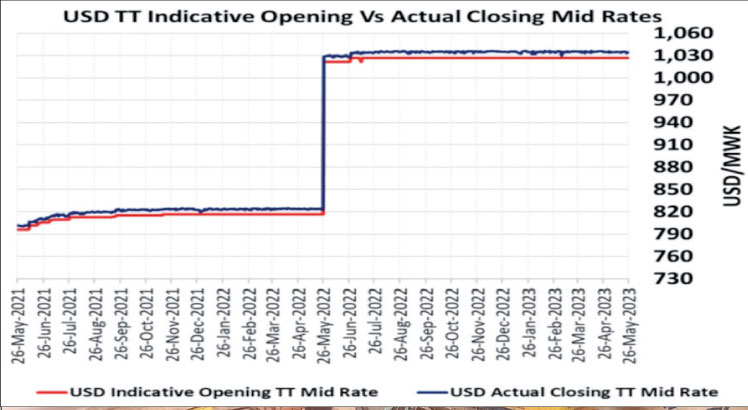Forex mismatch widens year after devaluation
One year after the Reserve Bank of Malawi (RBM) devalued the kwacha by 25 percent, misalignments in the foreign exchange market still prevail with figures showing a 49.61 percent spread between bank rates and the official rate.
The kwacha is trading at an average of K1 550 in authorised dealer banks (ADBs) against K1 036, which is the daily foreign exchange bureau rates published by the RBM. This is creating a spread of about K514.
Analysts says the prevailing spread, which is prevalent a year after the devaluation of the kwacha on May 27 2022, which was meant to align forex supply to macroeconomic fundamentals and ensure supply in the formal market, is a pointer to the pressure on the kwacha as demand for foreign currency surges against available supply.
Spot checks by Business News yesterday show that the parallel market rates are even higher than those in foreign exchange bureaus, where the local unit is trading at around K1 600 against the dollar.

Commenting on the developments yesterday, financial services strategist Misheck Esau said the devaluation of the kwacha has not achieved any objective that RBM wanted to achieve going by the disparities in both pricing and supply.
He said: “The devaluation of the currency was not backed by measures to restore confidence in the operation of market dynamics for price discovery.
“The fixed exchange rate regime that the authorities are pursuing has fallen flat on its own sword and we are back to square one a year later.”
Esau said in the medium to long-them, investment in production is the sole solution to the forex woes the country continues to experience.
On his part, economist and researcher Exley Silumbu said devaluation has done little to tame the supply and demand imbalances.
“What we are seeing here is that the devaluation was really not the answer as the situation has compounded even after the move,” he said.
In a separate interview, market analyst Bond Mtembezeka said usually, the parallel market and foreign exchange bureau rates reflect the true interplay between demand and supply of foreign currency on the market.
He said the situation shows that the scarcity of forex is a real issue, which is driving up the exchange rate.
When asked yesterday to assess the impact of devaluation one year on, Minister of Finance and Economic Affairs Sosten Gwengwe said RBM was better-placed to comment on the issue as it involves monetary policy.
RBM spokesperson Ralph Tseka yesterday asked for more time before he could comment, but in a statement issued towards the end of last year, the central bank said it believed that the current pressure on the exchange rate is fuelled by speculation and, therefore, not reflective of true demand and supply dynamics.
RBM devalued the local unit on May 27 2022 amid a crippling shortage of foreign exchange that has continued todate.





